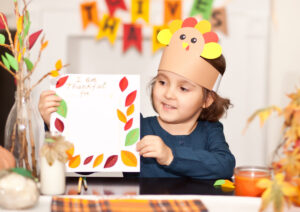 Caregivers often worry they are not raising children who are appreciative. With Thanksgiving on the horizon, now is the perfect time to focus on gratitude and the many ways to show it.
Caregivers often worry they are not raising children who are appreciative. With Thanksgiving on the horizon, now is the perfect time to focus on gratitude and the many ways to show it.
Children are not born feeling grateful so they begin to understand the concept they also need to begin learning how to practice and show it. As early as age 2 they may start expressing thanks when asked. By ages 3-5, children can understand the concept of gratitude more deeply and show appreciation independently.
Teaching children gratitude is a gradual process that requires consistency, patience and creativity. The key is to help them understand the value of appreciation and make it a regular part of their lives.
Here are some effective ways to teach children thankfulness:
- Model Gratitude in Everyday Life – Children learn by watching the adults around them. When you show appreciation for others and express thanks in daily interactions, you set a positive example.
- Talk About What You are Grateful for – Add time each day to openly talk about what you’re grateful for. This can be at mealtimes, on the ride home from school or at bedtime. This practice helps everyone reflect on the positives of the day and share good things with those they love.
- Teach Them to Say Thank You – Teaching children how and when to say thank you is important. This can include thanking people for gifts, compliments or acts of kindness. Don’t forget to remind them! Over time, they will learn that saying thank you is a meaningful way to recognize others.
- Practice Acts of Kindness Together – Acts of kindness can be as easy as writing a thank-you note, baking a treat for a neighbor, donating toys and clothing or volunteering at a local charity. Through giving, children learn the reciprocal nature of gratitude and develop empathy.
By actively practicing gratitude and making it a priority, children and adults may see many benefits, including a boost in happiness and well-being. Give yourself and your family time to experiment with different ways to be appreciative . Once you find strategies that work best for your family, gratitude will become a regular part of your lives.